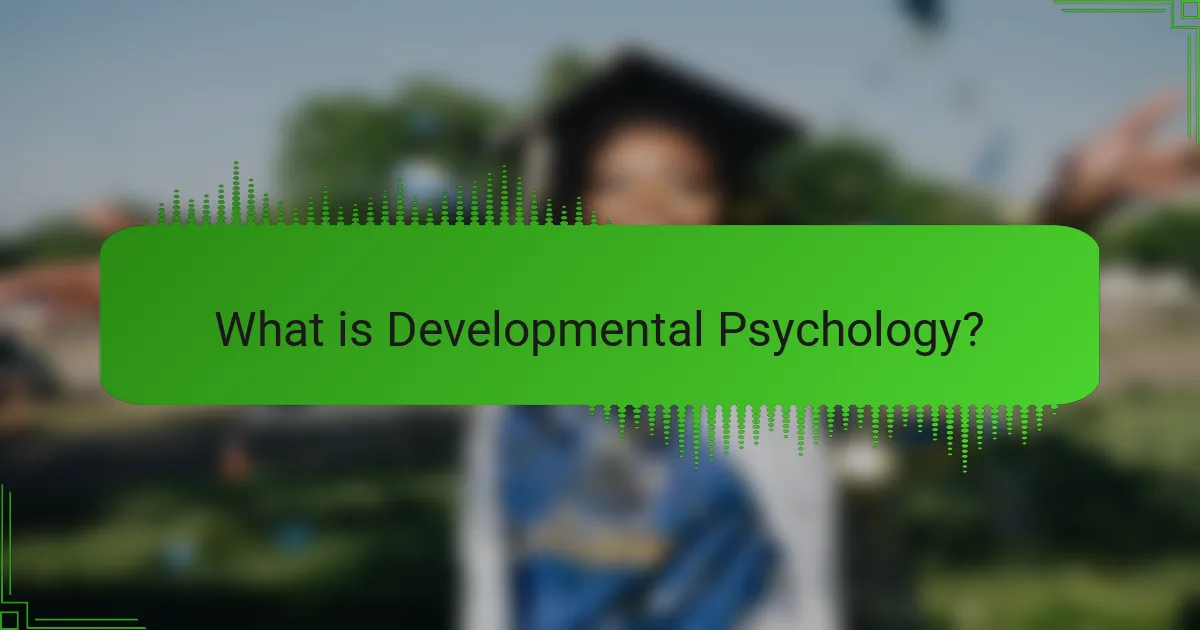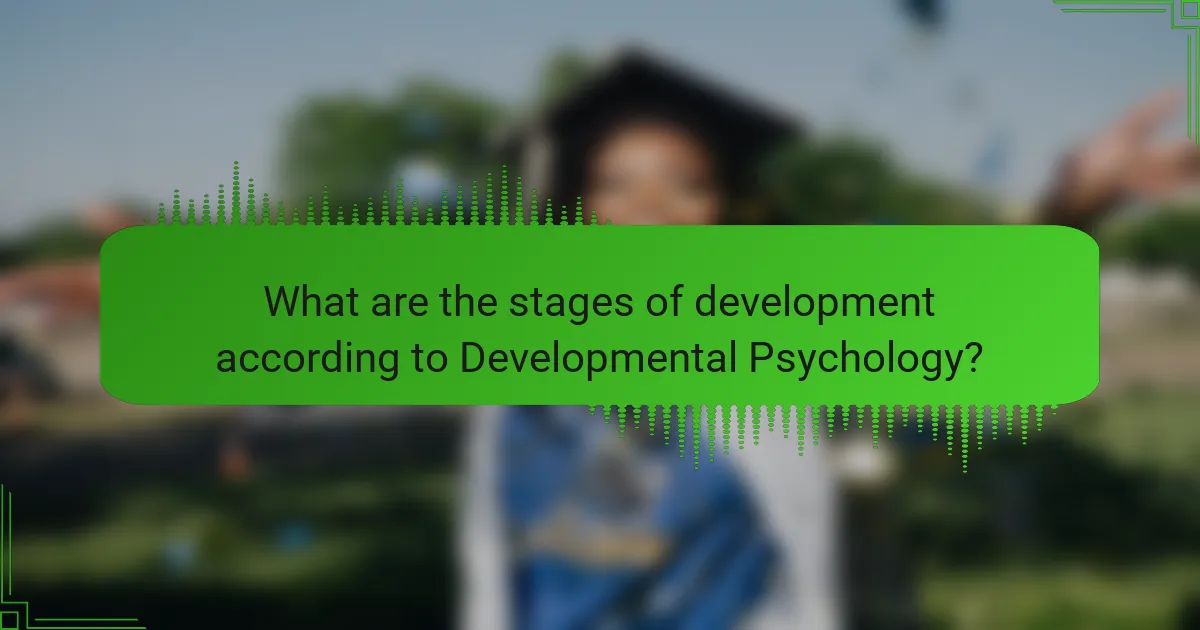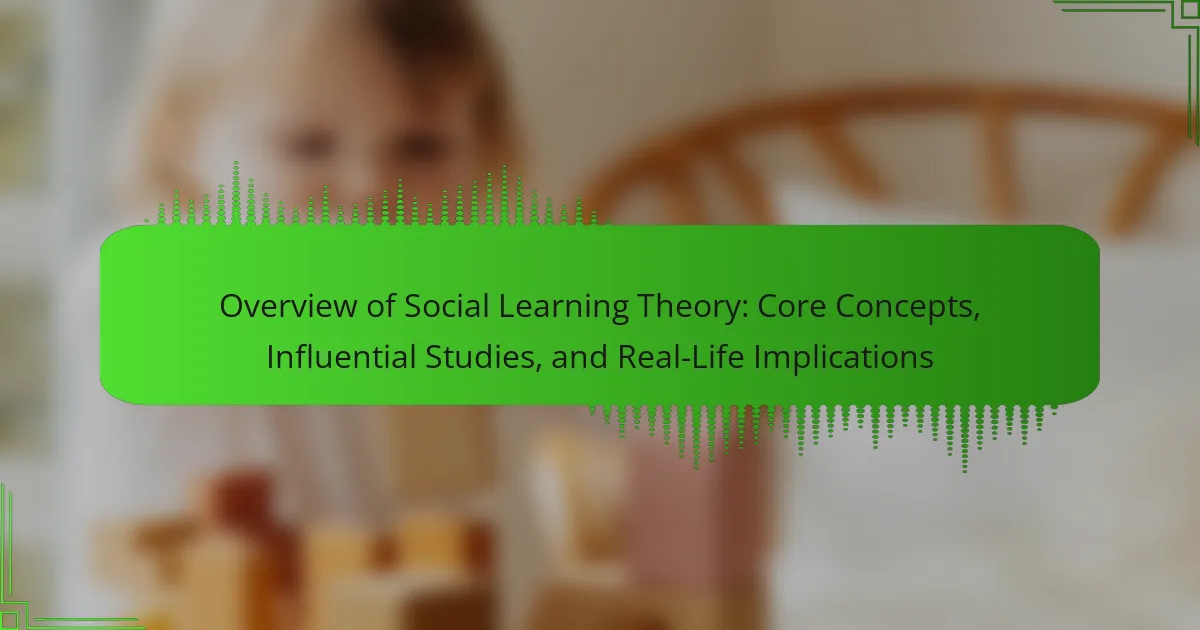Developmental psychology is the scientific study of how and why human beings change throughout their lives, examining psychological, emotional, and social development from infancy to old age. The field encompasses major theories, including Freud’s Psychosexual Theory, Erikson’s Psychosocial Theory, Piaget’s Cognitive Development Theory, and Vygotsky’s Sociocultural Theory, each contributing to our understanding of human growth. Key stages of development are defined by theorists like Erikson, who identified eight psychosocial stages, and Piaget, who outlined four stages of cognitive development. Prominent researchers such as Jean Piaget, Erik Erikson, and Lev Vygotsky have significantly influenced the discipline, shaping practices in education, healthcare, and social services. This overview highlights the foundational concepts and theories that are essential for understanding developmental psychology.

What is Developmental Psychology?
Developmental psychology is the scientific study of how and why human beings change over the course of their life. This field examines the psychological, emotional, and social development from infancy through old age. Developmental psychology encompasses various stages, including cognitive, emotional, and social growth. The discipline is rooted in theories proposed by influential psychologists such as Jean Piaget and Erik Erikson. Research in this area often involves longitudinal studies to observe changes over time. Developmental psychology is critical for understanding normal development and identifying developmental disorders. It informs practices in education, healthcare, and social services.
How does Developmental Psychology differ from other psychological fields?
Developmental psychology focuses specifically on the psychological growth and changes that occur throughout a person’s lifespan. Unlike other psychological fields, which may concentrate on specific disorders or cognitive processes, developmental psychology examines how individuals evolve from infancy to old age. This field integrates insights from biology, sociology, and education to understand the impact of various factors on development. For example, it studies cognitive, emotional, and social changes at different life stages. Developmental psychology also emphasizes the role of milestones in human growth, such as language acquisition and moral reasoning. This focus on lifespan development distinguishes it from clinical psychology, which primarily addresses mental health issues, and cognitive psychology, which centers on mental processes.
What are the key concepts that define Developmental Psychology?
Developmental psychology focuses on the changes in human behavior and mental processes throughout life. Key concepts include stages of development, which outline distinct phases individuals go through, such as infancy, childhood, adolescence, and adulthood. Theories such as Piaget’s cognitive development theory emphasize how thinking evolves over time. Erikson’s psychosocial development theory highlights the impact of social interactions on personal growth. Attachment theory, established by Bowlby, examines the bonds formed between children and caregivers. Additionally, the influence of nature versus nurture is a fundamental debate, exploring genetic and environmental impacts on development. These concepts collectively provide a framework for understanding human growth and change.
How has Developmental Psychology evolved over time?
Developmental Psychology has evolved significantly since its inception in the late 19th century. Initially, it focused on child development, influenced by theorists like G. Stanley Hall. In the early 20th century, Sigmund Freud introduced psychoanalytic theories, emphasizing the impact of early experiences. Jean Piaget later contributed by outlining stages of cognitive development, highlighting children’s active role in learning. The mid-20th century saw the rise of behaviorism, with B.F. Skinner focusing on observable behaviors and their modification. In the latter half of the century, Lev Vygotsky emphasized the social context of learning, introducing the concept of the Zone of Proximal Development. More recently, the field has integrated neuroscience, exploring the biological bases of development. This evolution reflects a broader understanding of human development across the lifespan, incorporating cognitive, emotional, and social dimensions.
Why is Developmental Psychology important?
Developmental psychology is important because it studies how people grow and change throughout their lives. This field provides insights into cognitive, emotional, and social development from infancy to old age. Understanding these changes helps in identifying developmental milestones and potential delays. Research in developmental psychology informs educational practices and parenting strategies. For example, studies show that early interventions can significantly improve outcomes for children with developmental disorders. Additionally, this discipline aids in addressing mental health issues by understanding their origins in developmental stages. Overall, developmental psychology is crucial for promoting healthy development and well-being across the lifespan.
What insights does Developmental Psychology provide about human behavior?
Developmental Psychology provides insights into how individuals grow and change throughout their lifespan. It examines cognitive, emotional, and social development. Key theories, such as Piaget’s stages of cognitive development, highlight how thinking evolves. Erikson’s psychosocial stages illustrate the impact of social relationships on identity. Research indicates that early experiences shape future behaviors and personality traits. Longitudinal studies show that development is influenced by both genetics and environment. These insights help in understanding behavioral patterns across different life stages.
How can Developmental Psychology inform educational practices?
Developmental psychology can inform educational practices by providing insights into how students learn and develop. Understanding cognitive, social, and emotional development helps educators tailor their teaching methods. For example, Piaget’s theory of cognitive development emphasizes the importance of developmental stages in learning. This means that teaching strategies should align with students’ developmental levels. Vygotsky’s social development theory highlights the role of social interaction in learning. Educators can implement collaborative learning activities to enhance understanding. Research shows that applying developmental psychology principles can lead to improved student engagement and academic success. Studies indicate that differentiated instruction based on developmental needs increases learning outcomes.

What are the major theories in Developmental Psychology?
The major theories in Developmental Psychology include Freud’s Psychosexual Theory, Erikson’s Psychosocial Theory, Piaget’s Cognitive Development Theory, and Vygotsky’s Sociocultural Theory. Freud’s theory emphasizes the influence of unconscious desires and childhood experiences on development. Erikson’s theory outlines eight stages of psychosocial development, each characterized by a specific conflict. Piaget’s theory focuses on cognitive development through stages, highlighting how children construct knowledge. Vygotsky’s theory stresses the importance of social interaction and cultural context in learning and development. Each of these theories has significantly shaped our understanding of human growth and behavior.
What are the foundational theories that shaped Developmental Psychology?
The foundational theories that shaped Developmental Psychology include Psychoanalytic Theory, Behaviorism, Cognitive Development Theory, and Social Learning Theory. Psychoanalytic Theory, proposed by Sigmund Freud, emphasizes the role of unconscious processes and childhood experiences in shaping personality. Behaviorism, led by B.F. Skinner and John Watson, focuses on observable behaviors and the effects of environmental stimuli on development. Cognitive Development Theory, developed by Jean Piaget, outlines stages of cognitive growth, emphasizing how children construct knowledge. Social Learning Theory, introduced by Albert Bandura, highlights the importance of observational learning and modeling in behavior acquisition. These theories collectively provide a comprehensive framework for understanding human development across the lifespan.
How do Piaget’s stages of cognitive development contribute to the field?
Piaget’s stages of cognitive development provide a framework for understanding how children’s thinking evolves. These stages outline the progression from sensorimotor to formal operational thought. Each stage represents a distinct phase in cognitive growth. This framework aids educators in tailoring teaching methods to children’s developmental levels. It also informs psychological assessments and interventions. Research shows that Piaget’s theory has influenced curriculum design and educational practices. Studies indicate that recognizing these stages enhances learning outcomes. Overall, Piaget’s contributions have shaped developmental psychology significantly.
What role does Erikson’s psychosocial development theory play in understanding human growth?
Erikson’s psychosocial development theory plays a crucial role in understanding human growth by outlining eight distinct stages that individuals navigate throughout their lives. Each stage presents a central conflict that must be resolved for healthy psychological development. For example, the first stage, trust versus mistrust, occurs in infancy and sets the foundation for future relationships. The theory emphasizes the impact of social interactions on personality development. Erikson’s model integrates both social and emotional factors, highlighting their significance in shaping identity. Research indicates that successful resolution of these conflicts leads to positive outcomes in adulthood, such as better relationships and self-esteem. This framework provides a comprehensive lens to examine the interplay between societal influences and individual growth.
How do contemporary theories expand on traditional views?
Contemporary theories expand on traditional views by integrating new research findings and diverse perspectives. Traditional views often focus on linear development stages. In contrast, contemporary theories emphasize the role of culture, social context, and individual differences. For example, Vygotsky’s sociocultural theory highlights the importance of social interactions in learning. This contrasts with Piaget’s focus on cognitive development as an isolated process. Additionally, contemporary theories often incorporate findings from neuroscience. Research shows that brain development continues into young adulthood, challenging earlier views on fixed stages. These advancements provide a more holistic understanding of human development.
What is the significance of Vygotsky’s social development theory?
Vygotsky’s social development theory emphasizes the fundamental role of social interaction in cognitive development. It asserts that learning occurs through social engagement, where individuals construct knowledge collaboratively. This theory introduces the concept of the Zone of Proximal Development (ZPD), which highlights the difference between what a learner can do independently and what they can achieve with guidance. Research indicates that social contexts significantly influence learning processes. Vygotsky’s ideas have shaped educational practices, promoting collaborative learning and scaffolding techniques. His work underscores the importance of cultural tools in cognitive development, further validating his theory’s relevance in understanding learning dynamics.
How does attachment theory influence our understanding of relationships?
Attachment theory explains how early relationships with caregivers shape emotional bonds in adulthood. It identifies four attachment styles: secure, anxious, avoidant, and disorganized. Each style influences how individuals approach intimacy, trust, and communication in relationships. Research by Mary Ainsworth and John Bowlby highlights that secure attachment leads to healthier relationships. In contrast, insecure attachments can result in fear of closeness or dependency issues. Studies show that individuals with secure attachments tend to have more satisfying and stable relationships. Attachment styles can also affect conflict resolution and emotional regulation. Understanding these dynamics helps therapists and individuals improve relationship functioning.

What are the stages of development according to Developmental Psychology?
The stages of development according to Developmental Psychology typically include several key phases. These phases are often categorized by theorists, such as Erik Erikson and Jean Piaget. Erikson proposed eight psychosocial stages, starting from infancy and extending to late adulthood. These stages focus on conflicts and challenges at each age that influence personality development. Piaget identified four cognitive development stages, which include sensorimotor, preoperational, concrete operational, and formal operational stages. Each stage reflects how children understand the world and develop reasoning skills. These frameworks have been widely recognized and studied in the field of psychology, supporting the understanding of human growth and development across the lifespan.
What are the key stages of human development?
The key stages of human development are typically categorized into several phases. These phases include prenatal, infancy, early childhood, middle childhood, adolescence, early adulthood, middle adulthood, and late adulthood. Prenatal development occurs from conception to birth, involving significant physical and neurological growth. Infancy spans from birth to two years, marked by rapid development in motor skills and sensory perception. Early childhood, from ages two to six, involves language acquisition and basic social skills. Middle childhood, from ages six to twelve, focuses on cognitive development and peer relationships. Adolescence, from ages twelve to eighteen, includes identity formation and emotional growth. Early adulthood, from ages eighteen to forty, often involves establishing personal and professional relationships. Middle adulthood, from ages forty to sixty-five, typically centers on career development and family life. Late adulthood, from sixty-five onward, involves reflection on life and coping with aging. These stages reflect a framework widely recognized in developmental psychology, supported by research in the field.
How do the stages of infancy and early childhood differ?
Infancy and early childhood are distinct stages of human development. Infancy typically spans from birth to 12 months. During this phase, infants develop basic motor skills and sensory awareness. They rely heavily on caregivers for survival and emotional security. Early childhood follows, lasting from ages 1 to 6. In this stage, children gain language skills and begin social interactions. They develop a sense of independence and engage in imaginative play. Infants primarily communicate through crying and gestures. In contrast, early childhood involves verbal communication and more complex emotional expressions. These differences highlight the evolving cognitive and social capabilities as children grow.
What developmental milestones are significant during adolescence?
Significant developmental milestones during adolescence include physical, cognitive, emotional, and social changes. Physically, adolescents experience puberty, leading to [censured] maturation and growth spurts. Cognitively, they develop advanced reasoning skills and the ability to think abstractly. Emotionally, adolescents begin to form their identities and experience a wider range of emotions. Socially, they seek independence from parents and establish deeper relationships with peers. Research indicates that these milestones are crucial for healthy development and influence future [censured] behavior. For instance, the transition to abstract thinking enhances problem-solving abilities and decision-making skills, as noted in developmental psychology studies.
How do cultural and social factors influence developmental stages?
Cultural and social factors significantly influence developmental stages by shaping individual experiences and perceptions. These factors dictate norms, values, and expectations that guide behavior. For instance, collectivist cultures emphasize community and family ties, which can affect social development and identity formation. In contrast, individualistic cultures may prioritize personal achievement and independence. Research shows that children raised in different cultural contexts develop distinct social skills and emotional responses. A study by Super and Harkness (1986) highlights how parenting styles vary across cultures, impacting cognitive and social development. Thus, cultural and social environments play a crucial role in shaping developmental trajectories.
What variations exist in developmental stages across different cultures?
Variations in developmental stages across different cultures include differing timelines and expectations for milestones. For instance, collectivist cultures often emphasize social interdependence, leading to earlier social skills development. In contrast, individualistic cultures may prioritize self-reliance, resulting in a different focus during early childhood. Research by Super and Harkness (1986) highlights how cultural practices shape child-rearing and developmental expectations. Furthermore, rites of passage in some cultures mark significant transitions, influencing perceptions of maturity. These cultural differences can affect cognitive, emotional, and social development, as evidenced by studies on parenting styles and their impact on child outcomes.
How do family dynamics impact individual development?
Family dynamics significantly influence individual development. They shape emotional, social, and cognitive growth. Positive family interactions foster secure attachments. Secure attachments lead to better social skills and emotional regulation. Conversely, negative dynamics can result in anxiety and behavioral issues. Research indicates that children from supportive families perform better academically. A study by the American Psychological Association found that family support correlates with higher self-esteem. Family structure, such as single-parent households, also affects developmental outcomes. Overall, family dynamics play a crucial role in shaping an individual’s life trajectory.

Who are the key researchers in Developmental Psychology?
Key researchers in Developmental Psychology include Jean Piaget, Erik Erikson, and Lev Vygotsky. Jean Piaget is known for his theory of cognitive development, which outlines stages children go through as they learn. Erik Erikson introduced the psychosocial stages of development, emphasizing the impact of social experience across the lifespan. Lev Vygotsky focused on the social aspects of learning and the importance of cultural context. Their contributions have shaped the understanding of human development significantly.
What contributions have major researchers made to the field?
Major researchers have significantly advanced the field of developmental psychology through foundational theories and empirical studies. Jean Piaget introduced the theory of cognitive development, outlining stages children go through in learning. His work established a framework for understanding how children’s thinking evolves over time. Erik Erikson contributed the psychosocial development theory, which emphasizes the impact of social experiences across the lifespan. This model highlights eight stages of development, each characterized by a central conflict.
Lev Vygotsky’s sociocultural theory stressed the importance of social interaction in cognitive development. He introduced concepts such as the Zone of Proximal Development, which describes the difference between what a learner can do without help and what they can achieve with guidance. Albert Bandura’s social learning theory focused on observational learning and modeling, demonstrating how behavior is influenced by observing others. His research on self-efficacy has also been pivotal in understanding motivation and behavior.
These researchers’ contributions have laid the groundwork for modern developmental psychology, shaping educational practices and therapeutic approaches. Their theories continue to inform research and application in various fields, including education, counseling, and child development.
What are the notable findings from Jean Piaget’s research?
Jean Piaget’s research identified key stages of cognitive development in children. He proposed four stages: sensorimotor, preoperational, concrete operational, and formal operational. Each stage represents a different way of thinking and understanding the world. For example, in the sensorimotor stage, infants learn through sensory experiences and motor actions. In the preoperational stage, children begin to use language but struggle with logic and perspective-taking. The concrete operational stage sees children developing logical thought about concrete events. Finally, the formal operational stage allows for abstract reasoning and hypothetical thinking. Piaget’s findings emphasized that children actively construct knowledge through interactions with their environment. His work laid the foundation for understanding how cognitive abilities evolve over time.
How has Lev Vygotsky’s work influenced educational psychology?
Lev Vygotsky’s work has significantly influenced educational psychology through his theories on social interaction and cognitive development. His concept of the Zone of Proximal Development (ZPD) emphasizes the importance of social interaction in learning. Vygotsky argued that children learn best when guided by a more knowledgeable other. This idea has led to collaborative learning practices in classrooms. Additionally, Vygotsky’s focus on cultural tools highlights the role of language and symbols in cognitive development. His theories encourage educators to integrate cultural contexts into teaching methods. Research has shown that applying Vygotsky’s principles can enhance student engagement and understanding. Overall, his contributions have reshaped approaches to teaching and learning in educational psychology.
How do modern researchers continue to shape Developmental Psychology?
Modern researchers shape Developmental Psychology through innovative studies and theories. They explore cognitive, social, and emotional development across the lifespan. For instance, researchers like Jean Piaget and Lev Vygotsky laid foundational theories that are still referenced today. Recent studies focus on the impact of technology on child development. Research by the American Psychological Association highlights the role of digital media in shaping social skills. Additionally, longitudinal studies provide insights into developmental trajectories. These findings inform educational practices and parenting strategies. By integrating new methodologies, researchers continuously refine existing theories. Their work addresses contemporary challenges in developmental contexts.
What are the current trends in developmental research?
Current trends in developmental research focus on the integration of technology in studying growth patterns. Researchers are increasingly using neuroimaging techniques to explore brain development across the lifespan. There is a growing emphasis on understanding the impact of social media on adolescent development. Additionally, cross-cultural studies are gaining traction to examine developmental differences globally. Research is also focusing on the role of early childhood education in shaping cognitive abilities. The influence of genetics on development is being investigated more thoroughly. Lastly, there is a trend towards interdisciplinary approaches, combining insights from psychology, biology, and sociology.
How can emerging technologies enhance the study of development?
Emerging technologies can enhance the study of development by providing advanced tools for data collection and analysis. Technologies such as artificial intelligence and machine learning enable researchers to process vast amounts of data efficiently. These tools can identify patterns in developmental behaviors that may not be visible through traditional methods. Additionally, virtual reality offers immersive environments for studying developmental stages in real-time. This technology allows for controlled experiments that simulate various developmental scenarios. Furthermore, mobile applications facilitate longitudinal studies by collecting data from participants over extended periods. These innovations lead to more accurate and comprehensive insights into developmental psychology. Research shows that integrating technology in studies increases engagement and data reliability. For instance, a study by the American Psychological Association highlights the effectiveness of digital tools in enhancing participant interaction and data accuracy in developmental research.
What practical applications can be derived from Developmental Psychology?
Practical applications of developmental psychology include enhancing educational practices, improving mental health interventions, and informing parenting strategies. In education, understanding cognitive development helps tailor teaching methods to different age groups. For instance, Piaget’s theory emphasizes hands-on learning for children in the concrete operational stage. In mental health, developmental psychology aids in diagnosing and treating disorders by recognizing age-specific behaviors. Therapists use developmental milestones to assess emotional and social growth. Parenting strategies benefit from insights into child development, guiding parents on age-appropriate expectations and communication. Research shows that informed parenting leads to better emotional regulation in children. Overall, these applications illustrate how developmental psychology informs various aspects of human growth and functioning.
How can parents use principles of Developmental Psychology to support their children?
Parents can use principles of Developmental Psychology to support their children by applying theories that explain child development. For instance, they can utilize Jean Piaget’s stages of cognitive development to tailor learning activities suitable for their child’s age. This approach helps children grasp concepts at their developmental level, enhancing their understanding.
Additionally, parents can implement Lev Vygotsky’s social development theory by encouraging collaborative play and learning. This fosters social skills and cognitive growth through interaction with peers. Research shows that social interaction is crucial for cognitive development.
Moreover, parents can apply Erik Erikson’s psychosocial development stages to understand their child’s emotional needs. By recognizing the challenges associated with each stage, parents can provide appropriate support. For example, during the stage of initiative vs. guilt, parents can encourage independence while providing guidance.
Incorporating these principles not only aids in cognitive and emotional development but also strengthens the parent-child relationship. Studies indicate that supportive parenting influences positive developmental outcomes.
What strategies can educators implement based on developmental theories?
Educators can implement differentiated instruction based on developmental theories. This strategy tailors teaching methods to meet individual student’s developmental stages. For example, Piaget’s theory emphasizes hands-on learning for concrete operational learners. Vygotsky’s theory supports collaborative learning through social interaction. Additionally, using formative assessments allows educators to adjust instruction according to students’ progress. Incorporating scaffolding techniques can also help support learners as they build new skills. These strategies align with developmental theories to enhance learning outcomes effectively.
Developmental psychology is the scientific study of human growth and change throughout the lifespan, examining cognitive, emotional, and social development from infancy to old age. This article explores major theories such as those proposed by Jean Piaget, Erik Erikson, and Lev Vygotsky, highlighting key concepts and stages of development, including milestones during infancy, childhood, and adolescence. Additionally, it discusses the significance of family dynamics and cultural factors in shaping individual development, as well as practical applications of developmental psychology in education and parenting strategies. Key researchers and their contributions to the field are also outlined, providing a comprehensive overview of how developmental psychology informs our understanding of human behavior and growth.



